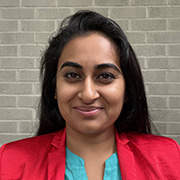A .gov website belongs to an official government organization in the United States.
A lock () or https:// means you've safely connected to the .gov website. Share sensitive information only on official, secure websites.

Anthropogenic aerosol emissions are expected to change rapidly over the coming decades, driving strong, spatially complex trends in temperature, hydroclimate, and extreme events both near and far from emission sources. Under-resourced, highly populated regions often bear the brunt of aerosols' climate and air quality effects, amplifying risk through heightened exposure and vulnerability. However, many policy-facing evaluations of near-term climate risk, including those in the latest Intergovernmental Panel on Climate Change assessment report, underrepresent aerosols' complex and regionally diverse climate effects. In this talk, I lay out the ways in which current climate risk assessment processes neglect aerosol signals and argue that this constitutes a major missing element in society's ability to prepare for future climate change. I highlight examples from recent research demonstrating aerosols' influence on the spatial pattern of heatwave exposure, their importance for improving regional climate models, and their unique impacts on crop yields. Finally, I outline a pathway towards progress and call for greater interaction between the aerosol research, impact modeling, scenario development, and risk assessment communities.
Dr. Geeta G. Persad is an Assistant Professor of Climate Science in the Jackson School of Geosciences at the University of Texas at Austin. Her research centers on application of numerical global climate modeling to understand the behavior of the physical climate system and its societal impacts, with a focus on the role of atmospheric aerosol pollution in regional and global climate change. Her group's work spans fundamental and policy-relevant climate analysis and has been funded by NSF, DOE, NOAA, Environmental Defense Fund, The Water Foundation, and DiCaprio Foundation. She holds a BS in Geophysics from Stanford University and a PhD in Atmospheric and Oceanic Sciences from Princeton University, where she was a NSF Graduate Research Fellow and a Ford Science, Technology, and Environmental Policy Fellow. Prior to UT Austin, she led the Western Water and Climate Program at the Union of Concerned Scientists and held research positions at the Carnegie Institution for Science and NOAA's Geophysical Fluid Dynamics Laboratory.
ALL Seminar attendees agree not to cite, quote, copy, or distribute material presented without the explicit written consent of the seminar presenter. Any opinions expressed in this seminar are those of the speaker alone and do not necessarily reflect the opinions of NOAA or CSL.